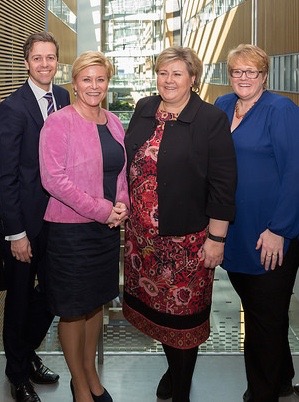Budget negotiations between Norway’s minority government coalition and its two centrist support parties in Parliament have taken a turn for the worse. There was serious talk heading into the weekend that ongoing disagreement amongst them could spark a “crisis” that may topple the government and put a Labour-led coalition in charge.

Prime Minister Erna Solberg of the Conservatives and Finance Minister Siv Jensen of the conservative Progress Party had been putting a positive spin on the talks, claiming just a few weeks ago that the tone was good and they were sure they’d settle budget differences. Solberg and Jensen, however, have been unwilling to go along with the Liberal Party’s demands for higher fuel taxes, for example, and other measures aimed at making the budget more “green.”
On Thursday, a spokesman for the Progress Party said the government parties hadn’t touched fuel taxes in their latest budget offer. That means their “fuel tax ultimatum,” which calls for only a token increase, stands, and that’s unlikely to please the Liberals.
The government’s other small support party, the Christian Democrats, is also making demands that would make it able to claim that it’s had some influence on the government. While the Liberals want more climate-friendly measures in the budget aimed at cutting more carbon emissions, the Christian Democrats want to increase kontantstøtte (the cash payments parents can opt for if they don’t send their youngest children to Norway’s heavily subsidized day care centers) and have more professionally trained people working in day care centers.
Much of what’s at stake are issues at the heart of each individual party’s political platform, and clashes abound. While the Progress Party is strongly opposed to any increases in taxes and fees and wants to cut them instead, the Liberals want to raise various taxes. Both government parties favour various forms of deregulation while the Christian Democrats want to keep much of Norway’s regulatory framework intact, for example in the agriculture sector.
Solberg of the Conservatives wants to keep her coalition together but now faces a deadline of 6pm on Sunday. If her government’s two-party coalition fails to come to terms with the support parties, she may need to demand a vote of confidence in Parliament. She’d basically threaten to resign, and it remained highly questionable on Thursday whether the Christian Democrats and/or the Liberals would then accept the government’s state budget in order to keep the government from falling.

Another option would be for the four parties to send the proposed state budget to the Parliament without majority support for it, leaving it up to the various committees to hash out each ministry’s budget proposal. Unusual alliances could form, with the left-leaning and rural-oriented Center Party (which rarely if ever agrees with the Progress Party) already stating that it also opposes increases in fuel taxes, for example. Its constituents rely on their cars in outlying areas, something the Progress Party has recognized, and higher taxes on fuel prices that already are among the highest in the world would, both parties claim, make life much more difficult and expensive for rural residents who have few if any public transport options like those available in more urban areas.
All the parties have presented their own budget proposals and see opportunities to push their own positions through. Labour Party leader Jonas Gahr Støre, who could take over as prime minister if Solberg resigns, claimed last week that the conservative government’s use of more Oil Fund money and refusal to boost fuel taxes further, for example, means it “really has delivered its offer to resign.” Labour’s alternative budget reflects its solutions for redistribution of wealth and maintaining the social welfare state in Norway, by raising taxes by more than NOK 10 billion instead of dipping into the Oil Fund.
Reluctant opposition
Støre has said, though, that he really doesn’t want to take over as prime minister now, preferring to run an offensive election campaign next year (in advance of parliamentary elections in September) instead of what would amount to a defensive re-election campaign. While some political commentators in local media have claimed that opposition parties are running a “divide and conquer” campaign against Solberg’s government, the politicians themselves claim they want the government to stay together for the remainder of its four-term.
Newspaper Aftenposten reported Thursday that the next offers, if any, from Solberg’s Conservatives and Jensen’s Progress Party will be critical as to whether the government will survive. Norwegian Broadcasting (NRK) was reporting that the negotiations are the toughest yet since Solberg’s government assumed power in 2013.
“The prime minister and I have been very clear that this (it’s latest proposals) is as far as it’s possible to go in a budget,” Jensen told NRK Thursday morning. “We have stretched ourselves to meet the Liberals’ demands on climate policies.” With both her party and the Liberals’ sagging in public opinion polls, prestige is as much at stake as budget funding.
newsinenglish.no/Nina Berglund

